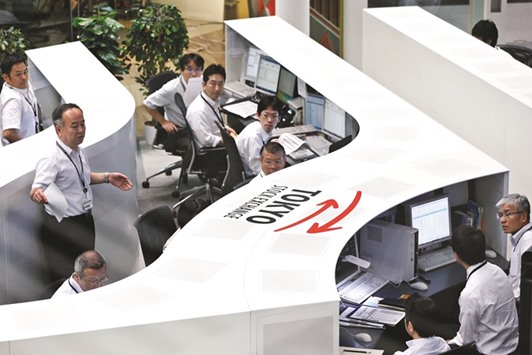Japanese stocks rose in thin trading, with the benchmark index capping a weekly advance, as insurers and carmakers led gains while the yen weakened against the dollar for a sixth day.
The Topix index rose 0.8% to 1,366.05 at the close in Tokyo, with volume about 27% lower than the 30-day average. The gauge climbed 1.6% in a shortened trading week after two weekly declines.
The Nikkei 225 Stock Average added 0.7% to 17,002.75 yesterday.
The yen fell 0.2% to 113.10 per dollar. Many financial markets in Asia, Europe and North America were closed yesterday for holidays.
“Many investors are in a wait-and-see mode, but it looks like we’re continuing to see some buying from pension funds,” says Ryuta Otsuka, a strategist at Toyo Securities Co in Tokyo.
Trust banks, seen as a proxy for retirement funds, were net buyers of Japanese stocks for a 17th straight week in the period ended March 18, according to data released yesterday by Japan Exchange Group.
Carmakers and electric-appliance producers were the biggest boosts to the Topix as the yen fell past 113 per dollar.
A weaker yen increases the value of overseas earnings when repatriated.
Akebono Brake Industry Co advanced 3% after SMBC Nikko Securities raised its rating to neutral from underperform.
Toyota Motor Corp and Honda Motor Co each rose 2.8%. Cookpad tumbled 13% after the recipe- website restored founder Akimitsu Sano as executive officer two days after he was removed from the position.
Data yesterday showed prices in Japan didn’t rise in February, reinforcing just how far the nation remains from reaching the Bank of Japan’s 2% inflation goal.
Time is ticking for Governor Haruhiko Kuroda, who is forecasting inflation will accelerate to reach 2% in about a year. Even with the central bank’s adoption in January of a negative interest rate alongside the BoJ’s already unprecedented asset purchases, prices aren’t rising.
BlackRock downgraded Japanese equities to neutral from overweight in a report dated March 23, citing increased volatility since the introduction of negative interest rates in late January and downside risk to exporter earnings from a significantly stronger yen.
The Topix has recovered about half its losses since the global equity rout at the start of the year sent the gauge into a bear market, as concerns eased over the Chinese economy and tanking oil prices. The measure is still down about 12% in 2016, and is trading at 14.4 times estimated earnings.
That compares with 17.2 for the Standard & Poor’s 500 Index and 15.2 for the Stoxx Europe 600 Index.
“Overall, Japanese stocks have remained around the same level since the start of March, but with oil prices on a recovering trend, we’re slightly in a risk-on state,” said Yoshinori Shigemi, a global market strategist in Tokyo at JPMorgan Asset Management.
“We might keep on going back and forth around 40 dollars a barrel, but the situation is we can take on a little more risk.”US crude dropped a second day to settle at $39.46 a barrel on Thursday after American stockpiles expanded again.
Oil has rebounded from a 12-year low last month on speculation the global surplus will ease as US production declines and major producers including Saudi Arabia and Russia proposed an output freeze.
Futures on the Standard & Poor’s 500 Index were unchanged.
The underlying US equity gauge closed on Thursday little changed, with the Standard & Poor’s 500 Index snapping a streak of five weekly gains that had wiped out all of its 2016 losses.

Traders work at the Tokyo Stock Exchange. The Topix index closed up 0.8% to 1,366.05 points yesterday.
